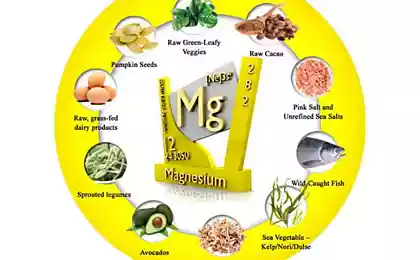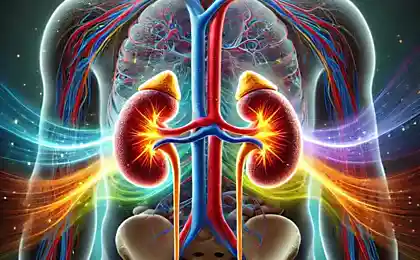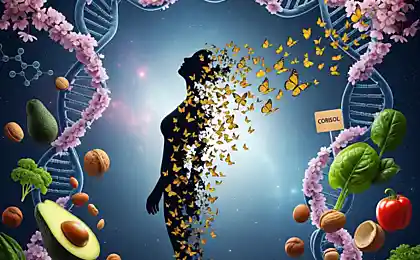508
Magnesium as an antidote for stress!
Stress and lack of magnesiumGerman neurologists analyzed the archive of Fyodor Dostoyevsky. His letters, diaries, his bitter and bright prose, records of the family doctor. As a result, in the journal "Neurology" published an article "have Suffered the great Russian writer by magnesium deficiency?"The verdict of doctors: Yes, of course.
Fifty years before the first application of magnesium in medicine (1906), Fyodor Dostoevsky wrote in his diary: "...Tossed and turned all night, slept half an hour. Grim dawn has brought no joy. Anguish and anxiety claws holding a heart. Writing, and drove to her throat com, do not breathe, there are tears in my eyes, and the hand from the constant writing is cramping". Modern neurologist, after reading these words, just say: all signs of magnesium deficiency in the body shown diet and magnesium preparations.
Eighty seven million seven hundred thirty seven thousand two hundred thirty five
Why we need magnesium?
Magnesium is an element involved in most major physiological processes. It is extremely important for the normal functioning of cells, muscles, and particularly of nervous tissue. The human body is not able to synthesize magnesium and so get it only through food. Magnesium is needed by all without exception, systems of the body, he "starts work" many enzymes involved in energy, protein, carbohydrate and fat metabolism. Only directly depends on it 300 biochemical processes, and indirectly – by several orders of magnitude more. So, for example, magnesium plays an important role in the prevention of diabetes.
Great importance of magnesium lies in the fact that it serves as a natural anti-stress factor that hinders the development of the processes of excitation in the Central nervous system and reduces sensitivity to external influences, relieves symptoms of anxiety and irritability. The fact that physiologically all the extreme effects lead to increased release of adrenal hormones, increased adrenaline in the blood. It removes magnesium from the cells through the kidneys. Therefore, almost all stress can be treated with magnesium.
In addition, independent studies by Russian scientists – professors of the International Institute of trace elements "for UNESCO" AA Spasova, J. I. Marshak has shown that restoring normal levels of magnesium reduces the craving for alcohol, drugs and Smoking, and is particularly effective in the treatment of addictions therapy "heavy artillery" — a special magnesium-drugs.
Everything else, you know that magnesium prevents calcium oxalate stones, which is the most common cause of urolithiasis. Studies have shown that consuming 500 mg of magnesium a day reduces the incidence of stone formation by 90 percent.
Mineral-norm
Despite its importance, magnesium is one of the most vulnerable microelement in our body. Its balance is easily upset. The daily adult requirement of magnesium is 300-350 mg. Because this trace element in the body itself is not produced, then the whole intake should come from food. But, unfortunately, over the past 100 years, we have to magnesium is much less. This most often happens due to improper nutrition. In the modern diet are very few products with a maximum content of magnesium is unrefined grains, and fresh fruits and vegetables. The situation is aggravated by the system of fast food, based on the use of refined foods, excess sugar and salt, as well as products that remove magnesium from the body — for example, the phosphoric acid contained in Coca-Cola and other soft drinks, various preservatives and other "E".
What are the causes of magnesium deficiency?
Insufficiency of magnesium may be due to the following factors:
P. S. And remember, only by changing their consumption — together we change the world! © Join us at Facebook , Vkontakte, Odnoklassniki
Source: medi.ru/doc/a1501102.htm
Fifty years before the first application of magnesium in medicine (1906), Fyodor Dostoevsky wrote in his diary: "...Tossed and turned all night, slept half an hour. Grim dawn has brought no joy. Anguish and anxiety claws holding a heart. Writing, and drove to her throat com, do not breathe, there are tears in my eyes, and the hand from the constant writing is cramping". Modern neurologist, after reading these words, just say: all signs of magnesium deficiency in the body shown diet and magnesium preparations.
Eighty seven million seven hundred thirty seven thousand two hundred thirty five
Why we need magnesium?
Magnesium is an element involved in most major physiological processes. It is extremely important for the normal functioning of cells, muscles, and particularly of nervous tissue. The human body is not able to synthesize magnesium and so get it only through food. Magnesium is needed by all without exception, systems of the body, he "starts work" many enzymes involved in energy, protein, carbohydrate and fat metabolism. Only directly depends on it 300 biochemical processes, and indirectly – by several orders of magnitude more. So, for example, magnesium plays an important role in the prevention of diabetes.
Great importance of magnesium lies in the fact that it serves as a natural anti-stress factor that hinders the development of the processes of excitation in the Central nervous system and reduces sensitivity to external influences, relieves symptoms of anxiety and irritability. The fact that physiologically all the extreme effects lead to increased release of adrenal hormones, increased adrenaline in the blood. It removes magnesium from the cells through the kidneys. Therefore, almost all stress can be treated with magnesium.
In addition, independent studies by Russian scientists – professors of the International Institute of trace elements "for UNESCO" AA Spasova, J. I. Marshak has shown that restoring normal levels of magnesium reduces the craving for alcohol, drugs and Smoking, and is particularly effective in the treatment of addictions therapy "heavy artillery" — a special magnesium-drugs.
Everything else, you know that magnesium prevents calcium oxalate stones, which is the most common cause of urolithiasis. Studies have shown that consuming 500 mg of magnesium a day reduces the incidence of stone formation by 90 percent.
Mineral-norm
Despite its importance, magnesium is one of the most vulnerable microelement in our body. Its balance is easily upset. The daily adult requirement of magnesium is 300-350 mg. Because this trace element in the body itself is not produced, then the whole intake should come from food. But, unfortunately, over the past 100 years, we have to magnesium is much less. This most often happens due to improper nutrition. In the modern diet are very few products with a maximum content of magnesium is unrefined grains, and fresh fruits and vegetables. The situation is aggravated by the system of fast food, based on the use of refined foods, excess sugar and salt, as well as products that remove magnesium from the body — for example, the phosphoric acid contained in Coca-Cola and other soft drinks, various preservatives and other "E".
What are the causes of magnesium deficiency?
Insufficiency of magnesium may be due to the following factors:
- Insufficient intake with food: poor nutrition, low-calorie diet, drinking alcohol, eating soft water, chronic or prolonged diarrhea.
- The increasing demands: for example, during growth, pregnancy, lactation; during intensive physical loads and in situations of stress and increased mental stress; during the period of rehabilitation after serious illnesses and injuries.
- Some medications can also be the cause of his failure (diuretics, cardiac glycosides, antibiotics (especially aminoglycosides), corticosteroids, oral contraceptives, the Vice-hormone therapy, anti-inflammatory drugs etc.
- Low solar insolation: the winter of the year, work in dark rooms. What symptoms indicate a magnesium deficiency?
The first symptom is usually fatigue, a tendency to depression. Other manifestations include eyelid twitching, a feeling of tension, memory impairment, disturbance of sleep or insomnia, night cramps, sometimes numbness, dizziness, irritability, palpitations, "interruptions" in the heart, feeling short of breath, "lump" in the throat. In case of insufficiency of magnesium may occur a vicious circle: lack of this mineral contributes to the development of stress, which in turn enhances its failure. More pronounced lack of magnesium can lead to the development of cardiovascular (arrhythmia) and gastrointestinal disorders.
P. S. And remember, only by changing their consumption — together we change the world! © Join us at Facebook , Vkontakte, Odnoklassniki
Source: medi.ru/doc/a1501102.htm























